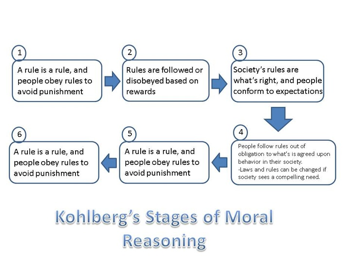Month 57
The brain has a boundless capacity to store information. Each time it processes new information, it goes through physical and chemical changes that form neural networks

Lawrence Kohlberg (1927-1987) described three stages of moral development, which described the process through which people learn to discriminate right from wrong and to develop increasingly sophisticated appreciations of morality.
According to Kohlberg, moral development is a lifelong task, and many people fail to develop the more advanced stages of moral understanding.
Kohlberg's first 'preconventional' level describes children whose understanding of morality is essentially only driven by consequences. Essentially, "might makes right" to a preconventional mind, and they worry about what is right in wrong so they don't get in trouble.
Second stage 'conventional' morality describes people who act in moral ways because they believe that following the rules is the best way to promote good personal relationships and a healthy community. A conventional morality person believes it is wrong to steal not just because he doesn't want to get punished but also because he doesn't want his friends or family to be harmed.
The final 'postconventional' level describes people whose view of morality transcend what the rules or laws say. Instead of just following rules without questioning them, 'postconventional' stage people determine what is moral based on a set of values or beliefs they think are right all the time.
How I think @ 57 months
The language skills at this age progress rapidly. They begin communicating in complex and compound sentences, have very few pronunciation errors and expand their vocabularies daily. They can follow multi-step directions and understand explanations given for things they can see. They frequently initiate conversations, are less likely to change the subject of conversation to areas of personal interest and are getting better at sharing personal experiences.
Motor Development: Gross Motor Skills
• My running is more controlled; I can start, stop, and turn
• I can turn somersaults; hop on one foot; gallop!
• I can easily catch, throw, and bounce a ball
• I can brush teeth, comb hair, wash, and dress with little assistance
Motor Development: Fine Motor Skills
• I can copy crosses and squares
• I can print some letters
• I can use table utensils skillfully
• I can cut on a line
Language and Thinking Development
• I use a 1,500-word vocabulary; speak in relatively complex sentences ("Mommy opened the door and the dog ran out.")
• I understand words that relate one idea to another — if, why, when
• I continue to learn through experience and the senses
• I understand, mostly, the difference between fantasy and reality
• I understand number and space concepts — more, less, bigger, in, under, behind
Social and Emotional Development
• I take turns, share, and cooperate!
• I express anger verbally rather than physically
• I can feel jealousy
• I may sometimes lie to protect myself, but understand the concept of lying
• I enjoy pretending and have a vivid imagination
Activities
Disclaimer: This presents an overview of child development. It is important to keep in mind that the time frames presented are averages and some children may achieve various developmental milestones earlier or later than the average but still be within the normal range of development. This information is presented to help parents understand, at a high level, what to expect from their child. Any questions/concerns you may have about your child’s development should be shared with your doctor.




